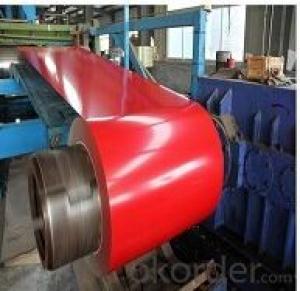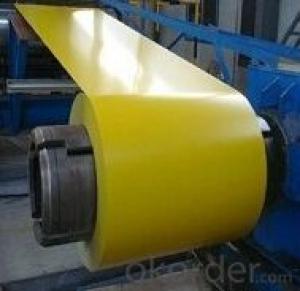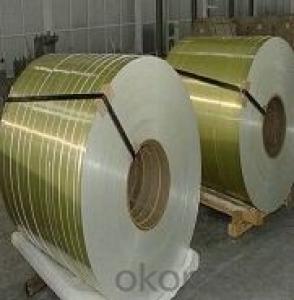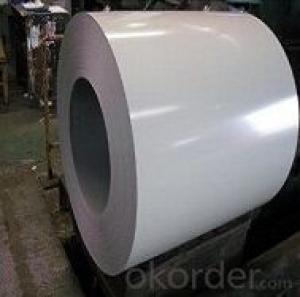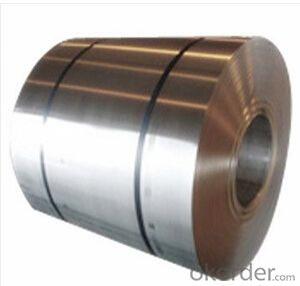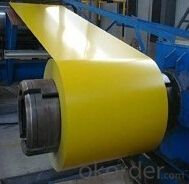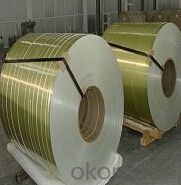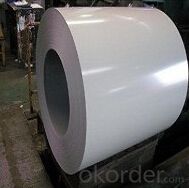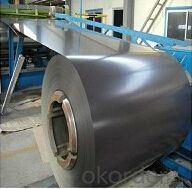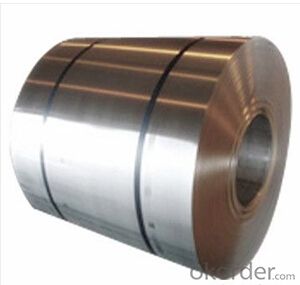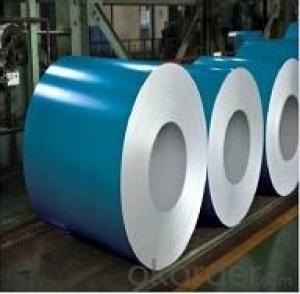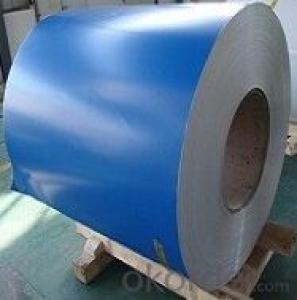0.12mm~1.3mm Prepainted Galvanized Steel Coil for Buildings
- Loading Port:
- Shanghai
- Payment Terms:
- TT OR LC
- Min Order Qty:
- 25 m.t.
- Supply Capability:
- 10000 m.t./month
OKorder Service Pledge
OKorder Financial Service
You Might Also Like
Basic Info.
Model NO.:MLK-2015157
Surface Treatment:Coated
Certification:ISO, SGS, BV, RoHS, IBR
Technique:Cold Rolled
Standard:ASTM, JIS, GB, AISI, DIN, BS
Application:Construction Material
Edge:Mill
Stock:Stock
Steel Grade:Dx51d, SGCC, Sgch, A653, Dx52D, Dx53D
Place of Origin: China
Width:600mm-1500mm
Thickness:0.13mm-0.8mm
Length:Customered
Delivery Time:15-30 Days
Zinc Coating:30-275G/M2
Top Color Coating:10-25
Bottom Color Coating:7-10
ID:508mm
Export Markets:South America, Eastern Europe, Southeast Asia, Africa, Oceania, Mid East, Eastern Asia
Additional Info.
Trademark:MALIKE OR OEM
Packing:Standard Seaworthy, Export Packing
Standard:AISI, ASTM, BS, DIN, GB, JIS
Origin:Shandong, China
HS Code:7210700000
Production Capacity:700mt/Day
| NAME | GALVANIZED | GALVALUME/ALUZINC | PPGI/PPGL |
| MODEL NO. | (0.13-1.2)mm*(600-1250)mm | ||
| TYPE | steel coil, steel sheets/ plates, corrugated steel sheets/plates | ||
| TECHNIQUE | Hot rolled-cold rolled-galvanized | hot rolled-coldrolled-galvalume /Aluzinc | Hot rolled-cold rolled--galvalume/galvanized - PPGL/PPGI |
| SURFACE TREATMENT | Mini/regular/ big/zero spangle, ,Chromate treatment/ chromate-free treatment/ untreated Unoile/ oiled ,TENSION LEVELLERT SKIN PASS anti-fingerprint/Un-anti-fingerprint, coating | Polyester(PE),Silicone Modified(SMP),Acrylic (AC), Polyurethane(PU)PVC Plastisol(PVC plastisol can be embossed to versatile texture)etc | |
| APPLICATION | Guardrails, ventilation ducts, gutters and down spouts, Pre-paint and post paint applications, gutters and down spouts, ceiling suspension bars, shutter door rails. Auto parts, electrical appliances, refrigerator appliances, signs, automotive parts,vending machines, washing machines, showcases and other structural use, roofing, commercial use | Gutters, auto parts, electrical appliances, vending machines, refrigerators, ovens, for pre-paint. structural use, roofing, commercial use etc | Electrical appliances, roofing, partitions. Factory buildings, elevator panelsetc Special applications: wear resistant steel, high-strength-steel plate |
- Q: How are steel coils used in the manufacturing of structural components?
- Steel coils are used in the manufacturing of structural components by being processed through various techniques such as cutting, bending, and welding to form the desired shapes and sizes. These coils serve as the raw material for fabricating beams, columns, and other structural elements used in buildings, bridges, and infrastructure projects. The high strength and durability of steel make it an ideal choice for constructing load-bearing components, ensuring the stability and integrity of the structures.
- Q: How are steel coils used in the manufacturing of steering systems?
- Steel coils are commonly used in the manufacturing of steering systems as they provide the necessary strength and durability required for various components such as steering racks, tie rods, and control arms. The steel coils are typically shaped, formed, and processed to create these parts, ensuring stability, precision, and reliability in steering mechanisms.
- Q: Where can I find a discount online for Stainless Steel Magnetic Knife Rack
- MIU Stainless-Steel Magnetic Knife Holder List Price: $39.99 Price: $27.99 this item ships for FREE with Super Saver Shipping. Details You Save: $12.00 (30%) Product Features * Magnetic for secure hold on knives * Contemporary design * Encased in attractive 18/10 stainless steel * Measures 20 inches long, ? inch wide, 2 inches thick * 20-inch Length x .75-inch Height x 2-inch Width Product Details * Product Dimensions: 23.6 x 5.4 x 3.2 inches ; 3.8 pounds * Shipping Weight: 4 pounds (View shipping rates and policies) * Shipping: This item can only be shipped to the 48 contiguous states. We regret it cannot be shipped to APO/FPO, Hawaii, Alaska, or Puerto Rico. * Shipping Advisory: This item must be shipped separately from other items in your order. Additional shipping charges will not apply. * ASIN: B0000DZDHB * Item model number: 90009 Product Description Stainless Steel 20-inch Magnetic Knife Holder
- Q: Can solution annealing be done on carbon and low alloy steels. please give an explanatory answer.
- No. Carbon steel has two different crystal structures, FCC and BCC , depending on the temperature. when you heat steel up and then quench it, it locks the crystal structure into the BCC form. this makes it hard. whereas precipitation hardened austentic stainlesses remain BCC regardless of the temp, so the hardness change is not a function of thermally induced strain. you can anneal carbon steel but the thermal profile is closer to the precipitation profile of PH stainlesses than it is to the Solution annealing profile.
- Q: What are the common challenges faced in steel coil production?
- Some common challenges faced in steel coil production include ensuring consistent quality and thickness of the coil, maintaining efficient production rates, managing inventory and storage of coils, addressing issues related to coil surface defects and handling, and adhering to strict safety regulations. Additionally, fluctuations in raw material prices and market demand pose further challenges for steel coil producers.
- Q: Which is used for what?Differences as far as style etc.???Better in your opinion and why??I'm just beginning to look at guitars i might be able to get at christmas if i'm still committed..i've been looking online.,,,,NYLON or STEEL STRINGED ACOUSTIC GUITAR????Thanks.
- Well first off, a nylon, or classical guitar, has nylon strings and a steel, or acoustic guitar, has steel strings (duh lol). A classical is used primarily for classical music. Its body is also a bit differently built then an acoustic. The classical technique primarily uses fingering, not pick strumming, since nylon is a weaker material and can break relatively easily with a pick. Now an acoustic is is a bit different. The body is built a bit more sturdier than a classical so it can take the larger tension of the strings. Acoustic guitars are used in a wide range of music genres, ranging from Country to Rap. So if your not into classical music, an acoustic is your best bet. Remember, NEVER try putting steel strings on a classical guitar, since the tension of the steel strings can break the guitar (i've seen it happen lol).
- Q: How are steel coils protected from condensation?
- Steel coils are protected from condensation by applying a layer of corrosion-resistant coating, such as zinc or a polymer, on the surface. This coating acts as a barrier, preventing moisture from coming into direct contact with the steel and reducing the chances of condensation occurring. Additionally, steel coils are often stored in controlled environments with controlled humidity levels to further minimize the potential for condensation.
- Q: Where are the coils and the steel plates used? Where did the steel plate come from?
- Steel plate is divided into many kinds of PU, low alloy, boiler plate, vessel plate, high strength plate, etc..
- Q: Is there any way to melt steel without the intense heat of a blast furnace?
- This Site Might Help You. RE: How do you melt steel without a blast furnace? Is there any way to melt steel without the intense heat of a blast furnace?
- Q: What are the different methods of coil handling and storage?
- Various industries commonly employ several different methods for coil handling and storage to ensure safety, efficiency, and preservation. Some of these methods include: 1. Coil cradles: Popular for handling and storing coils, coil cradles feature a U-shaped structure that provides stability and support. The cradle is positioned beneath the coil and can be easily maneuvered using forklifts or overhead cranes. 2. Coil cars: Used for transporting coils within a facility or between locations, coil cars are equipped with specialized clamps or arms to securely hold the coil during transit. Manual or automatic operation is determined by coil size and weight. 3. Coil racks: Specifically designed storage systems for organized coil storage, coil racks are typically constructed from steel and feature multiple levels or compartments to accommodate various coil sizes and types. Forklifts or overhead cranes are used to access coil racks. 4. Coil turnstiles: In processing lines where continuous coil feeding into machines is required, coil turnstiles are employed. These rotating devices enable easy loading and unloading of coils by rotating them to the desired position, facilitating handling and processing. 5. Coil pallets: Specially designed pallets made of steel or wood, coil pallets are utilized for both storage and transportation of coils. Their unique configuration allows for convenient loading and unloading using forklifts or pallet jacks. Coil pallets are often utilized for long-distance transportation or warehouse storage. 6. Coil storage racks: Large storage systems designed for bulk coil storage, coil storage racks are typically made of steel and feature multiple levels or compartments to accommodate a significant number of coils. Forklifts or overhead cranes are utilized for accessing coil storage racks. These examples represent only a selection of the numerous coil handling and storage methods commonly employed across various industries. The specific method chosen depends on factors such as coil size and weight, available space, and industry-specific requirements.
Send your message to us
0.12mm~1.3mm Prepainted Galvanized Steel Coil for Buildings
- Loading Port:
- Shanghai
- Payment Terms:
- TT OR LC
- Min Order Qty:
- 25 m.t.
- Supply Capability:
- 10000 m.t./month
OKorder Service Pledge
OKorder Financial Service
Similar products
Hot products
Hot Searches
Related keywords
